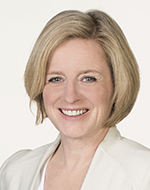Page Content
With the provincial government touting messages of fiscal belt-tightening and public sector wage freezes, the Alberta Teachers’ Association is answering with a simple counter message.
“Teachers feel that we have done our part on this, and I think it’s time for our government to stop looking at the expenditure side to help get them out of this deficit situation. They need to look at the revenue side,” said ATA president Greg Jeffery.
 |
| Rachel Notley, premier |
On Nov. 16 in a speech at the annual convention of the Alberta Association of Municipal Districts and Counties, Premier Rachel Notley said the next budget will see the government “carefully and compassionately tighten our belts.”
And on Nov. 28 Finance Minister Joe Ceci suggested the government would like public sector unions to help the province’s economic recovery by accepting no pay increases in their next collective agreements. By Dec. 1, Ceci was backtracking on his comment in communications with public-sector unions, saying that the government is committed to participating in free and open collective bargaining with its employees and with other unions representing public sector workers.
The province is currently in talks with the Alberta Union of Provincial Employees, the Health Sciences Association of Alberta and the United Nurses of Alberta. Ceci referenced last spring’s two-year deal with teachers, which includes no salary increases, as an example that he’d like other unions to follow.
His comments came during a news conference in which he delivered a second-quarter fiscal update touting a robust economic recovery that will bump Alberta’s GDP growth to four per cent this fiscal year rather than the 2.6 per cent that was forecast in last spring’s budget. The deficit is now forecast at
$10.3 billion compared to the $10.5 billion that was forecast in the first-quarter update.
|
"Alberta children should not have to pay
for the shortfalls in government revenue."
—Greg Jeffery, ATA president
|
Rather than focusing on spending cuts, the Association believes the government should look at increasing revenue by adjusting its tax regime. If Alberta’s tax regime was in line with that of B.C., the next lowest taxed province, the government would bring in an additional $8.7 billion in revenue, Jeffery said.
“Alberta children should not have to pay for the shortfalls in government revenue,” he said.
With the Association set to begin the next round of central table bargaining in the new year, Jeffery is choosing to ignore government talk of wage freezes.
“Referring to our last agreement seems almost like a warning to some of the other public sector unions; however, I’m going to choose to not take it as a warning to us because we’ve done our part,” Jeffery said.
“We are going to have some expectations in terms of the next round of collective bargaining, and I don’t think this announcement changes those expectations.”
No new taxes
In a statement provided via email, Education Minister David Eggen stated that education is one of the most important investments the government can make.
“That is why, when the recession hit two years ago, we had a choice. We could have made things worse by throwing thousands of people out of work and cutting programs or services. Rather than choose the path of extreme and risky cuts that some are still calling for, we chose to support Albertans by investing in services like education and building new schools,” Eggen stated.
The government is targeting $400 million worth of in-year savings this fiscal year and has achieved $300 million of this so far through administrative efficiencies.
“As we work to carefully balance the budget, we are targeting long-term operating expense growth below population growth plus inflation,” Eggen stated.
“Our government has been clear in our commitment to protect and improve education and health care as we reduce the deficit responsibly.”
On the tax front, in the early part of its mandate, the government increased the corporate income tax rate by two per cent and introduced higher personal income tax rates for Alberta’s highest earners, measures that are expected to raise more than $1 billion in 2017–18.
“With Alberta’s economy emerging from one of the worst recessions in a generation and many families still struggling, our government is not planning to increase tax levels for families or businesses,” Eggen stated.
Parental support needed
Jeffery said it’s important to give the government credit for funding growth in student enrolment; however, he noted that cuts in other areas like ESL funding and credit caps for high school students have had an impact.
“It’s death by a thousand cuts and the squeeze is being felt at the classroom level through increased class sizes,” he said.
Last month the Association launched a campaign to raise awareness of the issue of class size and complexity. The campaign is aimed at influencing the government’s budgetary process and has generated considerable interest among teachers.
“What will truly make a difference is if parents choose to become involved in that conversation,” he said. “Certainly teachers have an opinion and they live it every day, but parents have a vested interest, I think, in class size in this province and we need them to be telling the government their stories as well.”
| The government is beginning budget consultations with stakeholders in the next few weeks to discuss Budget 2018. ATA president Greg Jeffery has been invited to attend a prebudget consultation meeting with government representatives in mid-December. |
